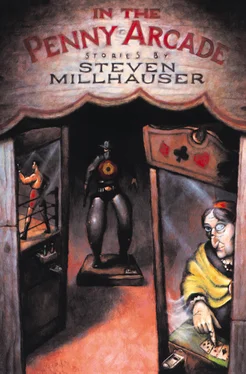They trudged uphill, Peter’s buckled boots jangling.
The second time it went much better: Catherine took the first curve smoothly, swung effortlessly onto the left fork, steered past the wild cherry, and never once felt herself slipping. She drove into their tracks beside the blurred snow-angel, and brought them to a stop five feet beyond their first mark.
She was exhilarated as they walked uphill. “Isn’t there something festive about snow? Festive and solemn. I can’t explain it. Oh, I can. It’s festive because it turns everything into odd shapes, and solemn because it’s white, like nurses, and hushed, and very smooth and formal, like a linen tablecloth.”
Peter laughed. “That’s wild. Have you got your scores back yet?”
“Not yet. Brad got 787 in Math.”
“Well, he can always join the Army.”
“He had to break the news gently to his mother. I hear Sonia got an 800 in posture.”
Peter burst into loud, nervous laughter.
The third time, it was Peter’s turn. Catherine lay on the sled and grasped the inside of the steering bar. “Watch out for that tree, Peter. Remember old Ethan Frome.” He pushed the sled, running behind as he bent over it, then threw himself lightly and easily on top of her as he took the outside of the steering bar. She could feel his chin pressing into her thick fur collar. They went much faster, took the curves well, rushed into the left fork, and flew past the wild cherry. At the bottom they came to a halt a few feet past their second mark — a record every time. She felt Peter moving her hair and kerchief away from her ear, and she heard him say “Love you” or “I love you.” She stayed very still. Nothing happened. All at once the weight left her body; she heard the jangle of boot buckles and a sharp crunch of snow.
When she was sure he was going away she looked over her shoulder and saw him walking across the driveway toward the garage.
Catherine dragged the sled up the hill and stood beside the willow. He had moved away her hair and said those words. She felt violated, betrayed.
Brad came over. “What happened to Peter?”
“Nothing. He got cold, I guess.”
“Would you care for company on the downward path to ruin?”
“Not now, Brad. I’ve had it, for a while.”
“Where’s Peter?” asked Bev.
“God, Peter Peter Peter. He just went inside. What’s all the commotion about?”
“Nothing. You’re standing there with his sled.”
“That is not a sled,” said Brad. “It is Peter, bewitched. Let us honor the memory of our late friend, Miss Carlotti, by sharing a ride.”
Catherine handed him the sled and walked through the soft, hanging twigs of the willow into the snowy flatness of the upper yard. Her red galoshes, black-red in the moonlight, sank almost to their furred tops. The black twig-ends of some buried bush stuck up out of the snow; a small withered leaf still clung to one of the twigs, and shook slightly. The sight of the trembling leaf disturbed Catherine, and she looked away. She came to a tall, broad pine that leaned to one side, as if it had begun to fall but had changed its mind. The long lower branches, heavy with clumps of snow, grew close to the ground. A few of the branches had been broken off, leaving an open space.
Catherine bent over and entered the prickly shelter of the tree. The outer parts of the branches were heavy with snow, but toward the trunk the branches showed their bark. She dusted off the bark of a thick branch and sat down, leaning back against the trunk and laying one leg along the branch. Through black and snowy pine-needles she could see the crowd by the willow, the bottom of the sledding path, and the open, dark garage.
It was not possible that Peter Schiller had said those words. It was so impossible that she wondered whether he had said something else, something that sounded like it. She tried to think of something that sounded like it, and began going through the alphabet: above, dove, glove — remembering, at “glove,” that in the ninth grade she had written an awful sonnet just that way, and wondering what had ever happened to that sonnet. Was it in the attic? Maybe he had said “I’m above you” or “A glove for you.” But she knew perfectly well what he had said. And he had walked away. He had said it and walked away. He had no right. And he knew it: he was ashamed. She and Peter Schiller were friends, they had been good friends for more than three years, but if they were good friends it was precisely because there was nothing more to it than that. She had never thought of him in that way. He was sweet, and irritating, and she could almost be herself with him; she liked to tease him about his horrible French pronunciation, and he had once written a limerick beginning “There was a young lady called Cath, Who was better at English than Math.” They were comrades. They hit it off. Catherine knew she had a playfulness about her, even a flirtatiousness, and she needed friends who were playful as well as intelligent. In the auditorium, where members of the National Honor Society were allowed to sit after lunch, she enjoyed a sense of light-heartedness, of pleasurable release from the routines and responsibilities of school, and not everyone rose to the occasion as Peter Schiller sometimes did. The fact was, they got on well together; and that was all. He was not her type. No one was her type. She had ridden down with him on the sled because he had asked her, but she would have ridden down with Brad or Roger or even Bill Newmeyer. They were all friends.
He had moved away her hair and whispered it. She had felt his finger on her ear. Suddenly she realized that he must have removed his glove. He had trapped her on the sled and said it.
Catherine heard a jangle of boot buckles; her stomach tightened, as if she were about to be punched. She wanted to run away, over the snow, into the sky, beyond the moon, but it was only Brad. He looked in at her, bending over and resting his gloved hands, leather and wool, on his knees. Bits of snow clung to his thick orange scarf, and a thread of snow hung from one eyebrow.
“Is anything wrong?”
“No, I’m just sitting here.” She gave a shrug and hugged herself. “I like it here. Did you make it down?”
“I think we went through the tree and came out the other side, but other than that. You’re sure nothing’s wrong?”
“I like watching from here. You have snow on your eyebrow. No, now it’s worse. You have snow on your glove.”
When he left, Catherine felt forlorn. Forlorn! The very word was like a bell. She was sitting alone in a cold tree, and everyone else was laughing, and sledding, and running up and down hills. He had said it, and there was no way he could unsay it. Catherine had vaguely expected to hear those words someday, just as she vaguely expected to hear “Will you marry me?”—she felt it was inevitable, there was no way around it — but they would be uttered by someone she could not even imagine. They had nothing whatever to do with anyone she knew, or with this town, or with this life. When she heard them, she would be somewhere else. She would not even be herself.
He had looked down strangely at her, lying in the snow. Now she would never know what he was thinking. She could never trust him. She wondered whether he had felt that way all of a sudden, or whether he had been feeling that way a long time. Once, in sophomore year, he had drawn a heart in the black wax of her dissecting pan. It had been a frog’s heart, with labels like PULMONARY VEINS and RIGHT AURICLE. He had drawn a feathered arrow going through it.
“Hey, are you all right?”
Catherine started; she had not heard Bev come up.
“Yes, I’m fine, I’m fine. What’s wrong with everybody tonight?”
“You’re sitting in a tree, Cath. Nobody else is sitting in a tree.”
Читать дальше












